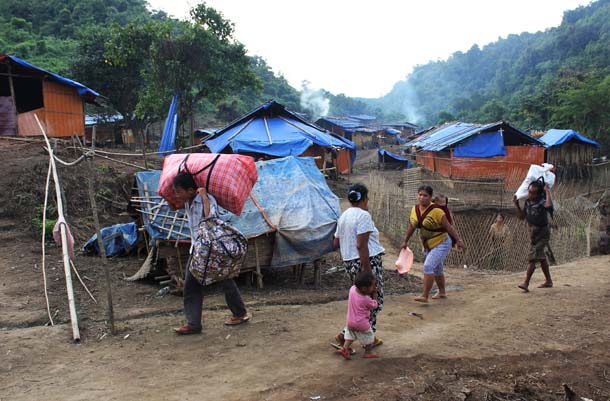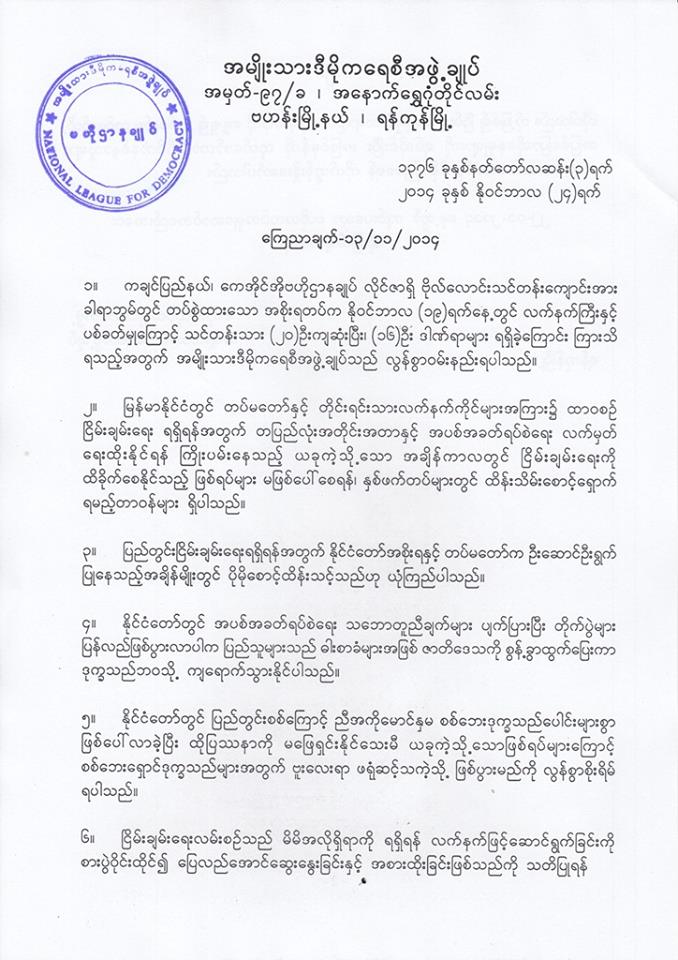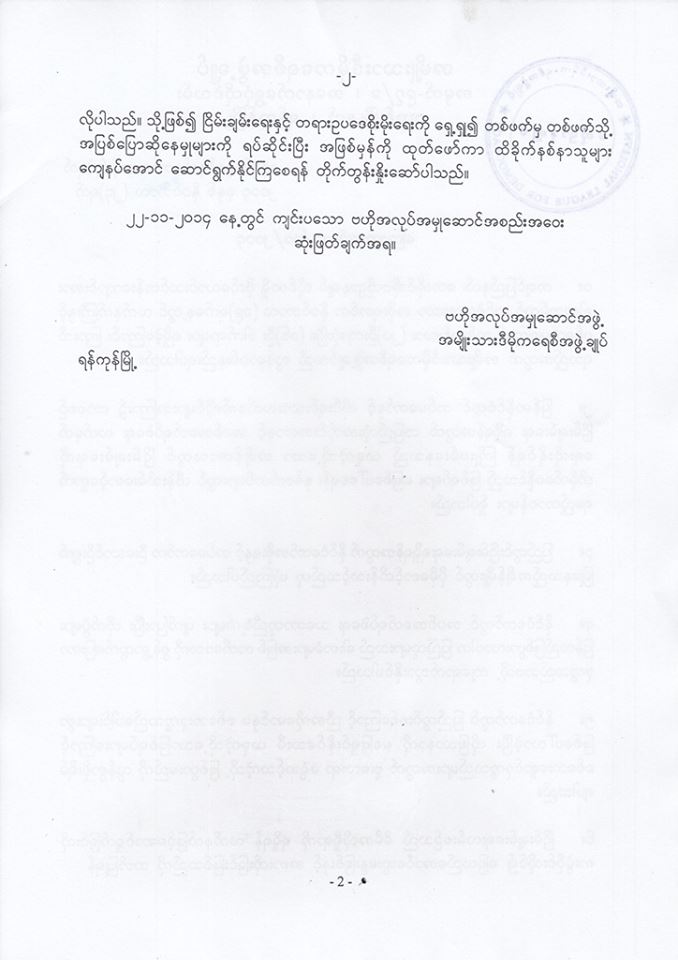Posts Tagged ‘IDPs’ (93 found)
To Recognize and Repair: Unofficial Truth Projects and the Need for Justice in Burma
 The advance towards a free and democratic Burma has so far done little to account for the crimes of its past. Emerging from a military dictatorship and opening its doors to the outside world has certainly led to an increased focus from the international community on the future of the country. As a result of increased scrutiny by the outside world, the U Thein Sein government has repeatedly reiterated their genuine commitment to improving the human rights situation. Despite government statements to the contrary, the situation for human rights defenders, journalists, farmers, land rights activists and civilians particularly in ethnic areas – has not improved […]
The advance towards a free and democratic Burma has so far done little to account for the crimes of its past. Emerging from a military dictatorship and opening its doors to the outside world has certainly led to an increased focus from the international community on the future of the country. As a result of increased scrutiny by the outside world, the U Thein Sein government has repeatedly reiterated their genuine commitment to improving the human rights situation. Despite government statements to the contrary, the situation for human rights defenders, journalists, farmers, land rights activists and civilians particularly in ethnic areas – has not improved […]
Myanmar: Four Years On,Impunity is the Kachin Conflict’s Hallmark
On the fourth anniversary of renewed fighting in Kachin and Shan states in northern Myanmar, Amnesty International joins with Kachin activists and national and international NGOs in calling for an end to human rights abuses and violations of international humanitarian law. The organization further calls for an end to persistent impunity, which is a hallmark of the conflict […]
• • •Outcome Statement of senior officials Workshop on UN Security Council Resolution 1325 on Women, Peace and Security and Related Resolutions
The Myanmar National Human Rights Commission (MNHRC) and UN Women, Myanmar organized a Workshop on UN Security Council Resolution, 1325 ( UNSCR 1325) on Women, Peace and Security, and related Resolutions in Nay Pyi Taw on 27-28 April 2015. The meeting brought together 41 participants – parliamentarians, senior government officials from ministries addressing women, peace and security issues, commissioners and staff of MNHRC and academics […]
• • •UN Myanmar Rights Expert: Backtracking on Democratic Space Gains Momentum in Election Year
YANGON / GENEVA – “Valuable gains made in the area of freedom of expression and assembly risk being lost,” United Nations Special Rapporteur Yanghee Lee said at the end of her ten-day official visit* to the country. “Indeed, there are signs that since my last visit, restrictions and harassment on civil society and the media may have worsened.” […]
• • •UN Special Rapporteur Yanghee Lee Should Focus on Violations of International Law
Burmese Rohingya Organisation UK today called on UN Special Rapporteur Yanghee Lee to make violations of international law against the Rohingya the main focus when she visits Rakhine State, Burma.
Burmese Rohingya Organisation UK is also calling on Yanghee Lee to recommend that UN Secretary General Ban Ki-moon personally take the lead in negotiating international humanitarian access in Rakhine State […]
• • •How Many More Lives? Burma Army Must Immediately Halt its Offensives in Kachin State
 Despite repeated calls from the international community, governments and civil society for an immediate halt to hostilities in Kachin and northern Shan State, on 19 November, 2014 the Burma Army fired several artillery missiles as “warning shots” onto the Kachin Independent Army’s (KIA) training academy in Laiza, Kachin State, killing 23 cadets and seriously injuring 20 others. Laiza is not only the KIA’s strong-hold. It is a city with over 20,000 civilians and a host to over 17,000 internally displaced persons (IDPs).
Despite repeated calls from the international community, governments and civil society for an immediate halt to hostilities in Kachin and northern Shan State, on 19 November, 2014 the Burma Army fired several artillery missiles as “warning shots” onto the Kachin Independent Army’s (KIA) training academy in Laiza, Kachin State, killing 23 cadets and seriously injuring 20 others. Laiza is not only the KIA’s strong-hold. It is a city with over 20,000 civilians and a host to over 17,000 internally displaced persons (IDPs).
Just days after the killing in Laiza, the Burma Army began firing shells near IDP camps. Some of the shells landed near a boarding school housing about 1,000 IDP children. These subsequent attacks near the camps threatened the lives of over 10,000 IDPs and raised much anxiety among the most vulnerable communities who have continuously fled the conflict. Fortunately, no one was hurt in these attacks, but many of the IDPs were forced to flee again in terror to the nearby jungle.
The narrative of “reform” and the sweeping political changes that have been praised and funded by the international community is quickly coming apart at the seams. While the Burma Government continues to use its rhetoric of change and democracy to encourage international governments, donors and investors to continue funding the peace process and development projects, they made one of the most deadly targeted attacks in Kachin State since the ceasefire broke down in 2011. This attack raised serious doubts among the ethnic groups who have threatened to abandon talks aimed at achieving a nationwide ceasefire accord. These talks, ongoing for nearly two years, have proved to be thus far redundant, as the Burma Army obviously has no other goal than the elimination of all ethnic armed groups without committing to any genuine, structural reforms. […]
• • •KWAT Condemns Repeated Burma Army Shelling along Kachin-China Border, Threatening Tens of Thousands of Civilians
The Kachin Women’s Association Thailand (KWAT) strongly condemns the repeated Burma Army shelling in the Laiza and Maijayang areas during November 19 to 23, 2014, which not only killed 23 cadets, but also endangered the lives of tens of thousands of civilians. KWAT is calling urgently for the Burma Army to end its offensives and begin troop withdrawal. […]
• • •Urgent Release: The Humanitarian Crisis Update and Key Messages for Kachin State and Northern Shan State
The Joint Strategy Team for Humanitarian Response in Kahcin and Northern Shan State would like to raise concerns over the recent increases of clashes and military actions near Laiza where over 17,000 IDPs are taking shelters in 4 camps. JST would like to request your urgent action and support for the safety and protection of the IDPs as well as ensuring unhindered and continuing humanitarian assistance for the IDPs in the KIO control area. […]
• • •Statement on Consultation Organized by Border-based Civil Society Organisations with the Nationwide Ceasefire Coordination Team (NCCT)
On November 22-23, 2014, 42 representatives of 25 border-based civil society organisations (CSOs), working on education, health, media, migrant workers’ rights, refugees, the environment, women’s issues and human rights, held a consultation meeting with the NCCT. This was the first such meeting with the NCCT held formally by a broad grouping of border-based CSOs. […]
• • •










 All posts
All posts